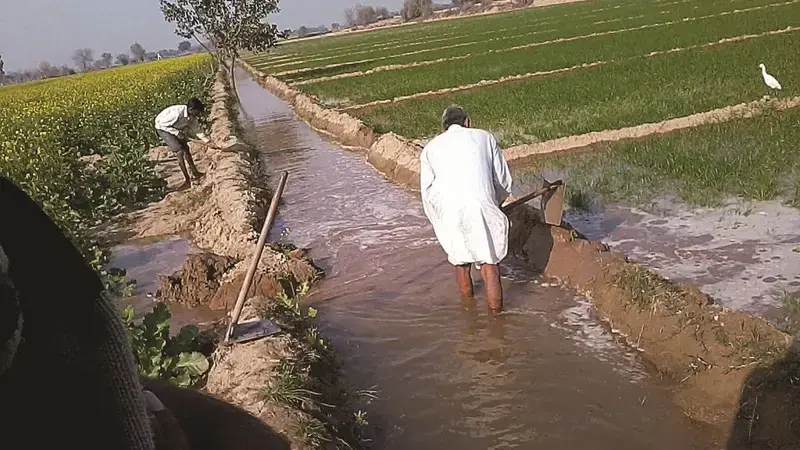Scientists alert on dire need to revamp large-scale irrigation systems for food security and sustainability
Published Date
February 16, 2016

Flood irrigation in Egypt
A proposition for overhaul and change
Large-scale irrigation systems (LSIS, defined as usually over 3000 ha) are a key global asset at the convergence of food security, climate change, rising energy costs and environmental health and accountability issues. These systems encompass 130 million hectares of land, which amounts to a very considerable 40% share of the global irrigated area. Using a conservative valuation they help produce US$ 355 billion annually of primary crop production. This places LSIS equivalent to the world’s sixth largest company on Forbes Global 2000 list for May 2014 (above Volkswagen Group, Toyota and PetroChina, but below BP).
By and large taken for granted, these LSIS are in dire need of attention and change, according to a team of six distinguished water and ecosystems services scientists. Citing the perpetual “build-neglect-rebuild” state of LSIS and the alarming decrease in development investment in the field of irrigation, the team has argued in a recent research paper (see end for reference) that the business-as-usual poor functioning of LSIS is posing a serious endangerment of agriculture’s contribution to society throughout the developing world.
The focus of concern for scientists from CGIAR centers ICARDA, IWMI, CGIAR Research Program on Water, Land and Ecosystems, and the University of East Anglia (UK) are large government-sponsored irrigation systems where public or public sponsored organizations are responsible for the operation and management of water distribution systems to farmers and irrigators. Utilizing prior irrigation studies and research findings, along with their insights, the scientists have concluded the LSIS sector is significantly underperforming. Deficiencies are evidenced by repeat cycles of irrigation “build-neglect-rebuild”, below par financial performance, low productivity, low levels of irrigation efficiences, declining capacity building, and a low level of spending on irrigation research. These issues present a sizable policy challenge in the global governance of environmental and societal goods and services.
To transform the irrigation sector they propose the application of a ‘theory of change’. At the center of the proposition is a “global irrigation compact”. This compact promotes new forms of leadership, partnership and ownership. Part of the recommended approach is to encourage a switch from the current ‘patronage with participation’ system, where aid finances are controlled by government irrigation agencies, to a system with funding partnerships between private, public and NGO advisory and regulatory services, which will develop strong leadership models and develop new alliances with cities and nearby river basin neighbors.
With the goal of sustainability, scientists posit moving away from “build-neglect-rebuild” to a “build-serve-earn-maintain-grow” upward-curving trend. Over the past 60 years, governments and their development partners have invested heavily in the creation of these irrigation systems; and too frequently have had to reinvest further within a few years to rebuild infrastructure. Although it is likely some government subsidies will always be necessary, the Theory of Change proposal hinges on a global compact that seeks much more robust forms of farmer leadership and ownership of the systems and crucial reforms that enable public, private and charitable agencies to become more cost-effective and business-like in supporting farmers.
LSIS produce significant quantities of major crop commodities that include wheat, rice and cotton and when managed effectively, they distribute water by gravity and are energy efficient, helping lessen global carbon dioxide emissions. Precise setup and management of LSIS is crucial as the systems can greatly alter the hydrology and water quality of rivers through their diversion, consumption and return flows of water, and thus significantly impact the timing and nature of water-based ecosystem services.
The paper puts forth global irrigation compact as an approach to revitalizing large-scale irrigation, aiming to stimulate new debate on national and global irrigation policies, and galvanizing stakeholders on this languishing but pressing issue. LSIS directly affects and contributes to UN’s Sustainable Development Goals of ending poverty via food security, water management, energy access, and the sustainability of terrestrial ecosystems.
To learn more, access full paper here: http://www.water-alternatives.org/index.php/alldoc/articles/vol9/v9issue1/302-a9-1-1
Reference: Lankford, B.A.; Makin, I.; Matthews, N.; Noble, A.; McCornick, P.G. and Shah, T. 2016. A compact to revitalize large-scale irrigation systems using a leadership-partnership-ownership 'theory of change'. Water Alternatives 9(1): 1-32
